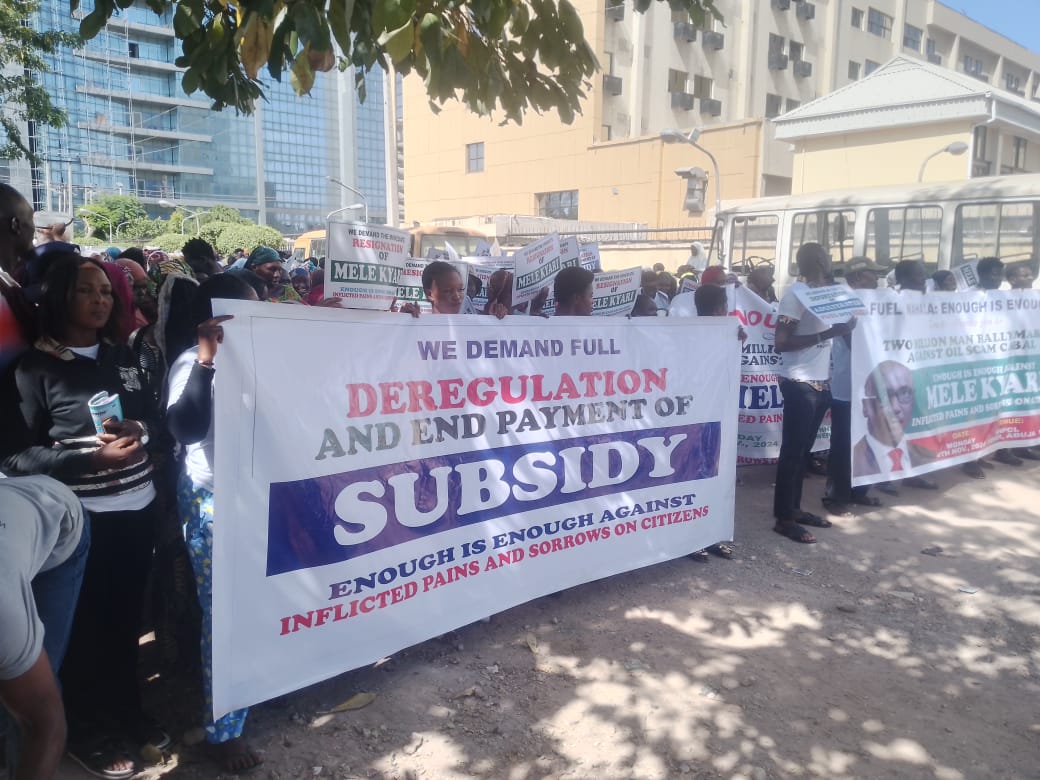Hundreds of protesters stormed the Three Arms Zone in Abuja yesterday, demanding urgent reforms in Nigeria’s troubled oil sector amid escalating fuel prices and persistent scarcity. The demonstration, organized by the APC Solidarity and Development Forum, brought together youth groups and civil society organizations who expressed deep frustration over the mounting economic challenges facing ordinary Nigerians.
The protesters, who gathered near the National Assembly Complex, highlighted the government’s failure to address the recurring fuel crisis despite repeated assurances. Group leaders Kabir Matazu and Danielsi Momoh delivered a strongly-worded letter to Senate President Godswill Akpabio and House Speaker Tajudeen Abbas, emphasizing how the ongoing crisis reflects deep-rooted systemic failures within the industry.
At the heart of their grievances lies the puzzling state of Nigeria’s refineries. The protesters pointed to a staggering $4 billion government investment that has yielded no operational local refineries, describing it as a glaring example of mismanagement and oversight failure. This situation, they argued, not only contradicts the current administration’s ‘renewed hope’ agenda but also underscores the urgent need for new leadership focused on transparency and accountability.
How can we justify spending billions of dollars on refineries that remain non-functional while our citizens struggle to afford fuel for their daily needs?” questioned Matazu during an interview with journalists. This is not just about fuel scarcity; it’s about the fundamental failure of governance and accountability in our oil sector.”
The demonstration highlighted a broader crisis in Nigeria’s oil industry, where despite being Africa’s largest oil producer, the country continues to rely heavily on imported refined petroleum products. This dependence has left citizens vulnerable to international market fluctuations and supply chain disruptions, resulting in unpredictable fuel prices and periodic scarcity.
The protesters raised particular concern over the importation of substandard petroleum products, which they claim poses significant risks to public health and safety. They demanded the National Assembly establish an investigative committee to probe alleged misconduct within the sector, insisting that officials found culpable be prosecuted through anti-corruption agencies.
We cannot continue to watch as our nation’s resources are mismanaged while citizens bear the brunt of these failures,” Momoh stated. “The time for concrete action is now. We need a complete overhaul of the system to ensure transparency, efficiency, and accountability.”
The demonstration comes at a critical time when many Nigerians are grappling with severe economic hardship, exacerbated by the removal of fuel subsidies and the subsequent spike in transportation costs and basic commodities. The protesters emphasized that the government’s inability to operate local refineries effectively has contributed significantly to the current economic challenges facing the nation.
Their demands extend beyond immediate relief measures, calling for long-term structural reforms that would transform Nigeria’s oil sector into an efficient, transparent, and productive industry capable of serving the nation’s interests. The protesters insisted that the National Assembly must take decisive action to implement these reforms and ensure proper oversight of the sector.
The demonstration represents a growing public frustration with the government’s handling of the oil sector and reflects broader concerns about economic management and governance. As citizens continue to face daily challenges related to fuel availability and pricing, the pressure on authorities to implement meaningful reforms is likely to intensify.
The protest’s organizers have promised to maintain pressure on the government until their demands are met, suggesting that this demonstration might be the first in a series of public actions aimed at forcing change in Nigeria’s oil sector. As the situation develops, all eyes are now on the National Assembly’s response to these demands and their willingness to implement the sweeping reforms necessary to address the crisis in Nigeria’s oil industry.




